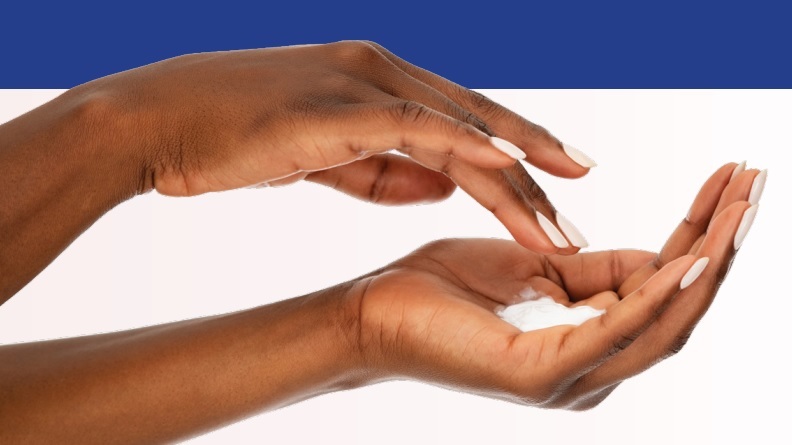Eczema

Eczema can be distressing to both sufferers and their families, so it’s important to manage this common disorder with the best daily skin routine available.
What is eczema?
If your skin is prone to rashes, itchiness and extreme dryness, you may have eczema.1
The itching makes you scratch, which in turn worsens the eczema, leading to an itch-scratch cycle which can damage your skin.2
Eczema is medically categorised under dermatitis, a general term for conditions that cause inflammation of the skin. There are several different types of eczema, and it’s possible to have more than one type.3
The most common type is atopic dermatitis, a term which is often used interchangeably with “eczema”.4 Atopic dermatitis is usually chronic (persisting long-term), and can occur on different parts of the body.5
If you have contact dermatitis, another type of eczema,your skin becomes inflamed where it makes physical contact with an irritant substance.5
Dry skin and eczema may look similar, but while dry skin is usually related to factors in your environment, eczema is more likely to have genetics or an immune system problem as causative factors. Home remedies often resolve dry skin, but eczema may require medical intervention.4
Eczema is also sometimes confused with psoriasis; these skin conditions look similar, and both may have an overactive immune system as a contributing factor. However, eczema typically has poorly demarcated dry areas with a fine scale (peeling), while psoriasis causes well-demarcated lesions (“plaques”) with heaped-up, white scaling.6
Flare-ups are times when eczema is worse, followed by periods of remission when the skin clears up. A trigger is something in your environment that causes a flare-up.3
Eczema isn’t contagious: it can’t be spread from one person to another.3
Who gets eczema?
Eczema is a common condition, but it occurs most often in babies and children. In many cases, it resolves completely before adolescence, but sometimes it persists into adolescence and adulthood. Occasionally, eczema first appears in adulthood.7
There’s a greater chance of developing the condition if you have a family history of eczema, or of an allergic disease such as asthma or hay fever.7
City dwellers are more likely than people living in rural areas to develop eczema, possibly because urban areas have worse air pollution. Dry or cold climates may also increase risk.8
Symptoms of eczema
Eczema usually starts suddenly with an extremely itchy skin; scratching the itch often causes a rash on one or several areas. Symptoms may include:2,9
- Itching
- Dry, scaly (flaky) patches
- Red rash (especially noticeable on people with lighter skin tones)
- Dark brown, purple or grey patches (especially on darker skin tones)
- Small, rough bumps (more common on darker skin tones)
- Warm skin that may be swollen because of inflammation
- Raw skin, scratch marks
- Bumps, rashes or blisters that ooze fluid and may crust over
- After healing, previously affected areas may appear lighter or darker than surrounding skin.
- Broken skin that may bleed
- Skin infections.
Over many years, repeated flare-ups and scratching can cause the skin to become thickened, cracked and persistently itchy.9
Poor sleep from itching and discomfort at night is common in anyone who has eczema.2,9
What causes eczema?
Eczema develops when there are problems with the skin’s natural barrier function. Normally, the skin’s outer layer acts as a protective barrier against irritants in the environment such as tobacco smoke, dust mites and fragrances in skin care products. This barrier also helps keep the skin hydrated, helping to prevent dryness and irritation.8
In eczema, however, gaps form in the barrier that allow too much moisture loss from the skin, causing dryness. This also makes it easier for environmental irritants to get through the barrier, causing inflammation. Germs can also cross the barrier more easily, which may lead to infection.8
How is eczema diagnosed?
Early diagnosis and treatment is important to help prevent eczema from worsening. The more severe the condition becomes, the harder it can be to treat and the greater the likelihood that it will persist into adulthood.1
To diagnose eczema, your doctor will likely ask about your exposure to potential triggers, your family history and whether you also have allergic conditions such as hay fever, asthma or food allergies. Your doctor will examine the affected skin area and may order lab tests to help confirm the diagnosis.10
How is eczema treated?
Eczema can’t be cured, but it can be effectively controlled to help relieve discomfort and reduce flare-ups.3 Treatment usually involves a combination of therapies. These may include:10,11
- Routine skin care, such as moisturising after bathing to help hydrate the skin and recreate its protective layer. Choose a reputable product such as E45 Cream, an emollient suitable for moisturising dry skin in a variety of skin conditions, including eczema.
- Prescription medications. These are usually topical ointments applied to the skin, to help exclude irritants and germs, while retaining moisture. If secondary infections develop from eczema, your doctor may also prescribe topical or oral antibiotics.
- Phototherapy, which involves using ultraviolet light in a medical setting to treat symptoms.
Living with eczema
Act to prevent dry skin
- Moisturise throughout the day with an emollient such as E45 Cream, specifically designed to help break the itch-scratch cycle. E45 Cream helps soften rough, hard skin, restore damage and prevent further breakdown of the natural protective barrier. It may be applied as frequently as needed and is suitable for all ages.11
- Complete your family’s daily skin care routine with a fragrance-free lotion from the E45 range, to further moisturise and soothe dry skin. E45 Moisturising Lotion, for example, is a light formulation that helps keep skin soft and supple.12-17

Take lukewarm baths or showers (maximum one per day) to clean the skin without drying it out excessively. Substitute soap with an emollient such as E45 Cream. Don’t dry off completely after bathing; pat dry gently then moisturise immediately to replenish dry skin.2
Don’t scratch or rub: this irritates the skin and increases inflammation and itchiness. Keep fingernails short.10 Lightly pinch or pat itchy skin instead. A cold compress, such a bag of frozen peas or ice wrapped in a towel, may reduce the itch. Don’t apply ice directly to the skin.2
Identify and avoid triggers where possible. Protect your skin from irritants and rough or scratchy clothing.10
Keep indoor temperature and humidity constant. Keep your home at a cool, pleasant temperature, and don’t let the air get too dry.10
Manage stress. Stress management and relaxation techniques can help reduce flare-ups.10
Get support. If you’re feeling overwhelmed about your eczema, reach out to family, friends and patient support groups, and consider consulting a mental health professional.10

BUY NOW
Related Brochures

dry-skin

atopic-dermatitis

infant-eczema-and-cradle-cap
